By Aleksandr Solzhenitsyn
Counterpoint, $28.00, 375 pages
Apricot Jam and Other Stories is a collection of interconnected tales by literary great Aleksandr Solzhenitsyn, the 1970 Nobel Prize winner whose works helped inform the world of the Gulag. Solzhenitsyn, who was expelled from the Soviet Union in 1974 and who died in 2008, toys with an experimental literary juxtaposition he calls “binary” in this collection, which is newly available in English. Much of the collection reads like quintessential Solzhenitsyn: dramatic, engaging, unapologetic, and defined by a suffocating Soviet presence. But the collection is marked by two disappointments: the translation is not as lyrical as his previous works, namely such classics as One Day in the Life of Ivan Denisovich and The Gulag Archipelago, and secondly, his stories do not transcend the gulf of history that has occurred since the mid-nineteenth century.
“That summer our troops invaded Czechoslovakia. That was the right thing to do: we couldn’t put up with the shenanigans going on there. Zhukov always took the problems of the Motherland more to heart than he did his own. And in the military sense, it was a first-class operation. It’s a fine thing — they haven’t forgotten the lessons of our old school.”
One cannot help but consider that if this collection had emerged in the 1960s, Solzhenitsyn would have been lauded as the bold, revolutionary storyteller that he was. But because Apricot Jam and Other Stories has come to us now, in a world where globalization and a world economy have united us – albeit uneasily – in far tighter ways than the mid-nineteenth-century Cold War ever could have imagined, the stories are repetitive of another era and do not carry the literary or political weight they once might have.
Jennie A. Harrop
[amazon asin=1582436029&text=Buy On Amazon&template=carousel]

